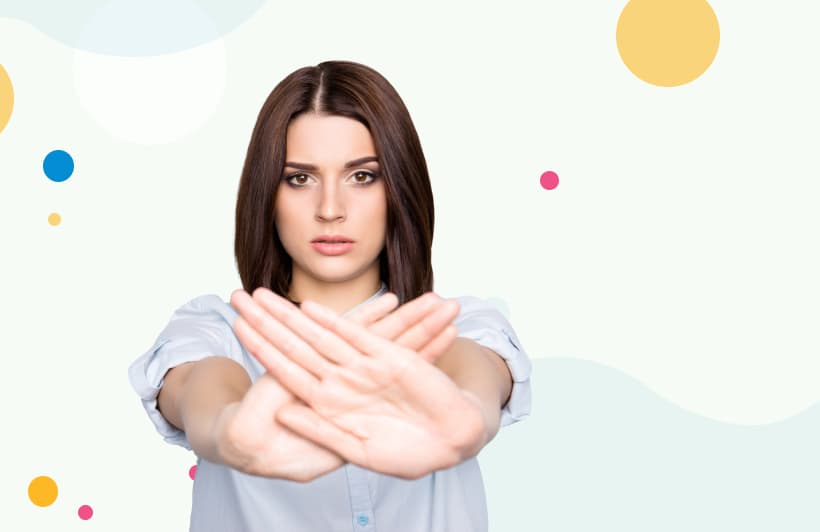
06 Aug, 2024

06 Aug, 2024

This article is medically reviewed by Dr. Abhishek Charan, Consultant – Medical Oncology, HCG Cancer Centre, Jaipur
The physical and mental impact that chemotherapy has on a cancer patient may vary from one case to another. The type of cancer treated, its stage, and the overall health of the patient are a few factors that impact a patient’s response to chemotherapy.
The following are some of the commonly observed side effects of chemotherapy:
The expert team will guide patients and their caregivers on the dos and don’ts that they should keep in mind before the chemotherapy begins. There are certain activities that patients should avoid while they are undergoing treatment, as those activities may negatively impact their treatment response, recovery, and the after-effects they experience.
The following are some of the things not to do while on chemotherapy:
The number of chemotherapy cycles administered to each patient varies depending on the severity of the disease. There is a gap of a few days between the cycles. This gap allows the patients to recover from the temporary ill effects of chemotherapy and regain their energy.
Chemotherapy causes significant fatigue and tiredness. Therefore, avoiding exertion and focusing on preparing the body for the next cycle is essential. Several methods help prevent overexertion.
Always maintain a good sleep cycle and get at least 8 hours of sleep. Additionally, a small nap in the afternoon is acceptable.
Do not hesitate to get help from family members in your daily activities. You may also reduce your working hours for some days after cancer treatment. If you have children at home, preferably seek childcare services to avoid overexertion. There are certain activities to avoid during chemotherapy, such as strenuous exercise during chemotherapy.
Poor dietary habits, a sedentary lifestyle, drinking alcohol, and smoking should be avoided during chemotherapy.
Chemotherapy may result in nausea, fatigue, hyperacidity, and a loss of appetite, and some patients also have a loss of appetite. However, to maintain energy levels, the patient needs to eat. Avoid eating large meals in one go. Instead, eat frequently in small quantities.
Strictly avoid eating undercooked or raw foods, such as meat and seafood. This will increase your risk of infection. Spicy foods also increase your discomfort due to oral sores and increased sensitivity. You should also avoid food with a pungent smell, as it may worsen nausea. Consuming healthy food during chemo improves overall health.
Be active and exercise under the guidance of professionals. Do not take any vitamins or mineral supplements without your doctor's knowledge. These may alter the efficacy of chemotherapy.
Smoking and drinking during the treatment of cancer enhance the cancer medication side effects and decrease the effectiveness of the administered treatments. It damages the lungs' functions, slows the healing process, and impairs immunity.
Alcohol interferes with medication metabolism and may affect its efficacy. Smoking and drinking also increase the risk of secondary cancers, thereby worsening recovery.
Chemotherapy reduces immunity. Thus, those on cancer treatment should avoid pathogenic exposure at all times. Minimize attending public gatherings and visiting crowded places. Carry hand sanitizers with you and use them when required. Request your well-wishers not to visit your home to meet you. Meeting more people increases the risk of infection.
Always wash your hands before eating. Take care while shaving or cutting nails, as it may also increase the risk of infection. Eat hygienic food, and do not eat leftovers. Always take good care of your incision (if surgery was a part of your cancer treatment).
If you experience any symptoms that indicate infection, such as a high fever, immediately contact your doctor. Never share your personal belongings, such as towels or razors, with others.
Diagnosed with cancer and undergoing cancer treatment causes significant distress to the patients and family members. Stress results in psychological alterations and mental pressure. Eventually, it will negatively impact overall health. Interact with family members, friends, and social groups. You may also use the services of professional counselors to manage stress.
Exercise, yoga, and meditation are the best ways to manage stress during cancer treatment. Patients need to keep a positive outlook and not lose hope. Note that with advancements in technology and the availability of novel drugs, the survival rates for various types of cancer have significantly improved.
Maintain a scheduled time for each activity. An unorganized life increases stress and takes away energy. Never miss your medications. In case you miss it, consult your doctor for further steps. If you are experiencing side effects and do not want to continue taking your medicines, immediately visit your doctor. He/she will prescribe an alternative.
Never stop taking the medication without consultation. Never miss your scheduled follow-up visits. Do not skip your counseling sessions, as these will help you manage your stress more efficiently and prepare you to fight cancer in a better way. You should provide all the information, such as side effects and missed doses, to your doctor. It will help in altering the treatment strategy.
Dr. Abhishek Charan
Taking new medications without a doctor's prescription during cancer treatment can be dangerous since they may interact with cancer therapies, causing side effects or decreasing treatment effectiveness.
Such medications can exaggerate side effects, reduce immunity, and mask symptoms that need medical attention. Be sure to discuss any new medication with your healthcare provider before adding it to ensure it is safe and appropriate for your treatment plan.
Exposure to patients with active illnesses of either a viral or bacterial nature is the source of several infectious diseases, especially during cancer treatment. In such cases, these illnesses become more challenging to treat due to the compromised immunity of the patients undergoing cancer treatment.
Patients undergoing cancer treatment should strike a balance between social interaction, practicing protective measures like frequent handwashing, and keeping away from direct contact with people who are sick.
A healthy diet during cancer treatment significantly supports general health, maintains strength, and promotes recovery. Therefore, it should be balanced with multiple nutrients, helping to manage the treatment's side effects like nausea, fatigue, and weakened immunity.
A balanced diet provides the proteins and calories required for healing and other structural functions that maintain muscle mass.
Appropriate treatment allows the body to make the treatment tolerable and decreases the possibility of complications. Consulting a dietitian can help patients consume the right types of foods that can have a positive impact on their overall cancer journey.
There are certain foods to avoid during chemotherapy to reduce the risk of infection or to prevent the worsening of the side effects of chemotherapy. Some of the foods to avoid during chemotherapy are:
HCG is one of the most comprehensive cancer hospitals in India for diagnosing and managing cancer. This cancer treatment center is equipped with advanced technologies, such as PET scans, CT scans, and genetic testing, to diagnose cancer accurately. The cancer care team, including medical oncologists, radiation oncologists, surgeons, and other staff, focuses on the patient-centered care approach. HCG creates a comfortable treatment setting for its patients with the help of modern facilities and strives to take care of its patients with leading-edge treatment protocols and help them return to the best state of health possible.
Chemotherapy significantly affects the overall health of the body. Patients undergoing chemotherapy may experience several side effects, such as fatigue, loss of appetite, hair loss, constipation or diarrhea, mouth sores, changes in thinking and memory, and anemia.
Patients should avoid strenuous activities and maintain a healthy lifestyle. They should avoid drinking and smoking, exposure to infections, unscheduled activities, consuming new medications without a doctor's prescription, and stress. The patients should avoid foods to avoid during chemotherapy, such as half-cooked fish, which is also important to prevent infection. Consume healthy foods to reduce side effects of chemotherapy.
The Most Common Side Effects Experienced by Patients Were Receiving First Cycle of Chemotherapy
Quality of Life and Side Effects Management in Cancer Treatment-A Cross Sectional Study
Exercise, Diet, and Weight Management During Cancer Treatment: ASCO Guideline
Physical Activity and Cancer Care—A Review - PMC
Cancer Diet: Foods to Add and Avoid During Cancer Treatment | Johns Hopkins Medicine
Assessment of Food Safety Knowledge and Behaviors of Cancer Patients Receiving Treatment - PMC

Author Bio : Dr. Mahesh Bandemegal
Consultant – Medical Oncology
MBBS, MD, DM (Medical Oncology)
Dr. Abhishek Charan is an experienced medical oncology consultant practicing at HCG Cancer Centre, a leading cancer hospital in Jaipur. He specializes in treating a broad spectrum of cancers using systemic therapies, namely chemotherapy, immunotherapy, and targeted therapy. His expertise lies in the areas of head and neck oncology, gynecological oncology, breast oncology, gastrointestinal oncology, pediatric oncology, and supportive care.
To book an appointment with Dr. Abhishek Charan, please click here.
